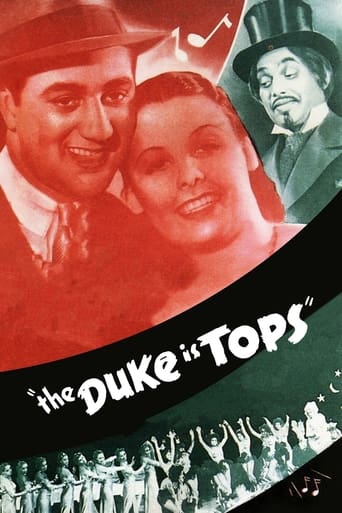arfdawg-1
Duke Davis has invested all his savings to back his sweetheart, Ethel, in a road show over the old T.O.B.A. circuit, on which they have both been performers since childhood. Marshall, a New York talent scout, makes an offer to Ethel as a single and, to induce her to take it, Duke writes a fake check, made out to him, for $5000 pretending he has sold his contract with Ethel to Marshall. Resentful and heartbroken, she accepts and becomes a big hit in New York. Marshall then books her at the swanky Century Club, plans her show himself, and it flops miserably. Meanwhile, Duke has used his last resources to start a new show, but without Ethel it also fails. He joins the Doc Dorando medicine show, and with him as the speiler for the quack elixir sold by Dorando, it is successful. He becomes Doc's partner with an elaborate trailer and a company of entertainers, including Willie Covans, the Basin Street Boys, The Cats and the Fiddle, "Rubberneck" Holmes and Joe Stevenson. Money is rolling in.LIght skinned blacks in a black only produced film from days gone by. Fairly typical of the genre. Largely important for Lena Horne.
MartinHafer
It says in the IMDb trivia section that Lena Horne was not paid for her work in this film. Does this mean she was cheated or that she agreed to make it for free? I'd love to know more about this.In the 1930s and 40s, due to segregation, Black people were often not allowed into movie theaters with Whites. So, Black theaters opened across the country--particularly in the South. And, in many cases, these theaters brought the audiences Black-produced films. The problem, however, was that the economics of the Black community were not even close to those in the country as a whole--and most films made by these tiny independent studios were pretty poor compared to the products of the majors. While this is not always true, the acting and writing were rather suspect--and production values were pretty shabby. So, as you watch "The Duke Is Tops", cut it a bit of slack--you cannot compare a film like this to the products of MGM, Warner and the like. Yes, it's sub-par--but it's also an interesting window into the times. singer and works for a guy named 'the Duke'. The acting is the worst part--and the director (if there even was one!) didn't seem to ever re-shoot scenes in which the actors stumbled over their lines or where the singers sounded flat. Horne, who really could act, looked dreadful--and you'd never have predicted her later stardom based on her acting in this one. She's certainly not the only poor one nor the worst actor in the film--but it looks like the film was shot in only a few days--which, incidentally, it was! However, on the plus side, some of the singing is quite good and the comedy works...occasionally. Overall, it's an odd curio of a bygone era, but not a good film.
Gary Imhoff
The Duke Is Tops is a black version of the white show business and Broadway movies popular in the 1930's. It has the struggling broke producer, the young performer who becomes a star overnight, and the medicine show to Broadway (or in this case fashionable Harlem nightclub) plot. It is best known as the debut movie of a beautiful, 21-year-old Lena Horne, but its real star is Ralph Cooper, who gets a brief opportunity to show his singing and bandleading abilities, as well as to dance a few steps. Much of the acting is stiff and the film's editing is crude, but it has all the pleasures of an early black musical -- specialty singers, eccentric dancers, and pretty chorus girls in skimpy bikinis -- as well as a more substantial script than many other black movies of its day (or of today, for that matter).
Schlockmeister
A great look at the black entertainment industry in 1938. A young Lena Horne shines in her performance as Ethel, a singer who makes her way to the 'big time'. Ralph Cooper plays her boyfriend Duke who is also involved in the entertainment business. As the film progresses, Duke and Erthel are separated and Duke throws his lot in with a travelling medicine show with the esteemed Doctor Dorando, played wonderfully by Laurence Criner. The time with the medicine show is one of this movies treasures as it gives the audience a rare look at how an actual medicine show operated around the South back then. Special musical guests are presented (great guitarist featured by the way...), the spiel is given and the medicine sells.As one of the stage performers shown on stage early in the movie, look for the fantastic moves of "Rubberneck Holmes". Don't worry, you will recognize him.A lot of these 'race movies' are a fantastic look at wonderful performers that were never presented in mainstream Hollywood. This movie is worth seeing.



